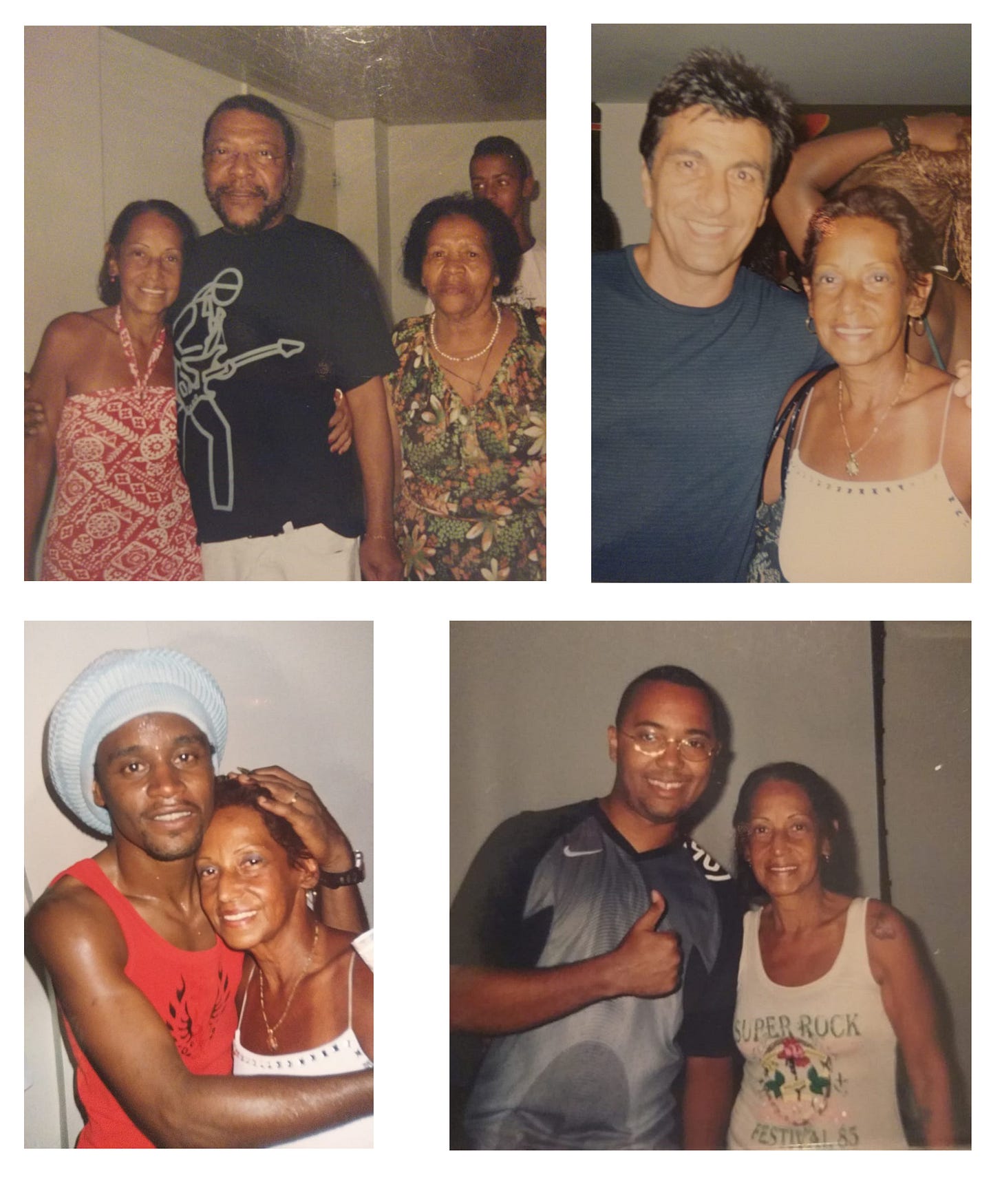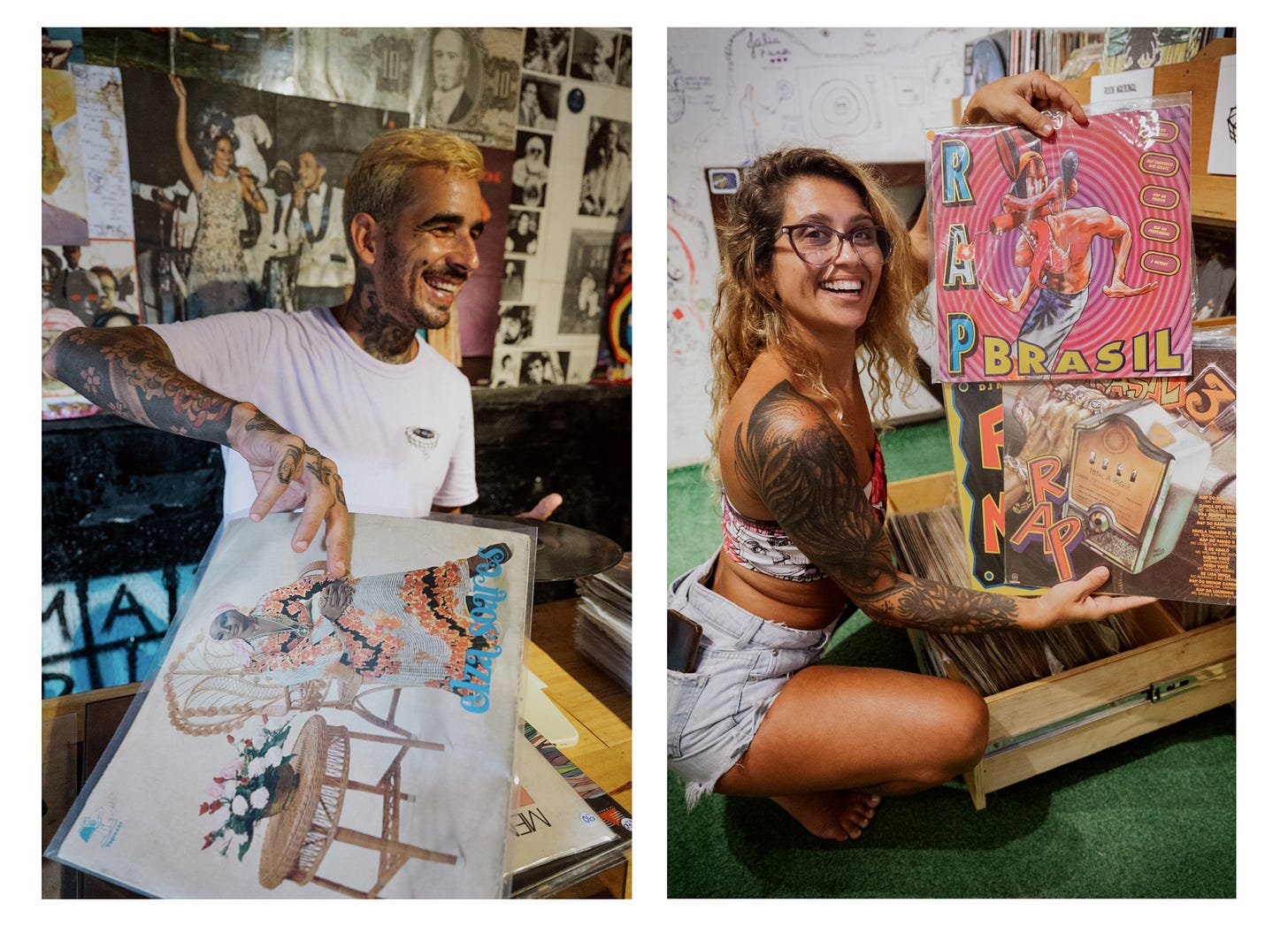Meia Volta #11: Marcão Baixada, What Caipira Music Stands For, and the "Party House" of Música Brasileira
Painting a Fuller Picture of Brazilian Music
Salve, Meia Volters! <3
Beatriz Miranda and Ted Somerville here, and we hope the sun is shining bright on your side :)
Before diving into Meia Volta #11, we would like you to know that we highly appreciate your readership and trust. Running an independent newsletter is often challenging, and we are not always able to deliver new issues as consistently as we would like to. Nevertheless, we are entirely committed to growing Meia Volta’s structure in the near future, producing original, credible, and high-quality content on a much more regular basis.
Now, without further ado… We are thrilled to present you Issue #11 of Meia Volta, the first newsletter to bring the nuances of Brazilian music they don’t tell you about 👌
In this issue…
The favorite Brazilian song of Rio award-winning rapper Marcão Baixada, the fun Brazilian chronicles that no one - but a house! - knows about, the story of caipira music, and more!
Bora lá? :)
BRAZILIAN SONG OF MY LIFE
Marcão Baixada is an award-winning rapper, composer, producer, and culture advisor from Baixada Fluminense, the northern region of Rio de Janeiro. In addition to his discography, his work as a producer includes collaborations with artists such as Marcelo D2, Cartel MCs, MC Marcelly, and Luccas Carlos.

“The Brazilian song of my life is "Preciso Me Encontrar". Written by Candeia and performed by Cartola, "Preciso Me Encontrar" (translates to “I Need to Find Myself”) is one of the most beautiful songs in Brazilian music to me. The trombone intro by Nelsinho is amazing and already shows the entire melody, and yet, when the chorus starts, it sounds completely new and fresh. Cartola brings all the feelings in his voice with each word and phrase. It's a song that makes you miss something- you don't know exactly what- and brings you nostalgia on a sunny afternoon. If you've seen the movie City of God, you know what I'm talking about.”
Marcão’s new-generation artist recommendation is Jazzaoquadrado.
WHAT’S SPINNIN’ - MARACA DISCOS PART II
After introducing you to Maraca Discos in Issue #8, we are thrilled to share the second part of the story behind this Rio vinyl record store.
Located in a wooded, residential street in the Maracanã neighborhood (Rio’s North Zone), the house that currently hosts Maraca Discos has a relationship with música brasileira that dates back to the 1970s. Long before Maraca Discos, the venue was a true headquarters for memorable gatherings of MPB icons. It was, no wonder, known as “Casa das Festas” (the “Parties House”, in Portuguese).
“Elza Soares was always there. She was like a sister to me,” said Edna Machado, 78, who lived in Casa das Festas with her family for most of her life. Edna is the grandmother of Edgar Ramos, the co-owner of Maraca Discos.
Among the regular visitors were Mussum and Leci Brandão, samba artists who lived nearby, but also Martinho da Vila, Agepê, Xangô da Mangueira, Paulinho da Viola, Luiz Carlos da Vila, Dicró, Peninha, and others.
“Elza Soares was always there. She was like a sister to me”
- Edna Machado
Edna’s involvement with música brasileira precedes Casa das Festas: “I have always liked samba music,” she says. Edna became acquainted with important Brazilian musicians when she married guitarist Paulo Sérgio (from the Rio rock band Os Populares) and, later, José Darcy Santana (the nephew of samba composer Martinho da Vila).
Recalling the most memorable events hosted in Casa das Festas, Edna highlights the birthday party of Almir Guineto, one of the musicians responsible for birthing pagode (a music genre derived from samba).
“Almir’s birthday basically closed the street. The house was full like never before. People like Arlindo Cruz, Elza Soares, and Beth Carvalho were all here. There was even a radio station covering the party. It was unforgettable,” Edna concluded.

See our Instagram page for a clip of Edgar telling the stories of Maraca.
BRAZILIAN MUSIC NEWS
In Brazil, July 13th marked the Day of Música Caipira.
While “música caipira” is still commonly understood as a generic term for Brazilian countryside music, a deeper look into this music culture reveals something else.
Música caipira (also frequently called “sertanejo raiz” or moda de viola”) corresponds to the ensemble of music traditions (from ways of playing/singing to specific guitar types) that were birthed in what used to be called the Paulistânia (an area that, today, comprehends the states of São Paulo, Mato Grosso, Mato Grosso do Sul, Goiás, Paraná, and Minas Gerais).
Among the remarkable elements of caipira music are the viola caipira (a ten-string, smaller guitar, with strings arranged in pairs), the ensembles (often duos of musicians), and the themes (lyrics that often portray what life was/is like in the Paulistânia).
Almir Sater, Tonico & Tinoco, Cornélio Pires, Jair Rodrigues, Milionário & José Rico, Pena Branca & Xavantinho, Tião Carreiro, and Sérgio Reis are some of the icons from the música caipira scene. Inezita Barroso, however, deserves special attention: One of the only female viola caipira players, she broke the música caipira stigma in the urban environments - particularly by playing the genre in elite nightclubs of São Paulo city.
Below is a playlist of must-listen música caipira pearls we have curated for you:
References:
https://radiobatuta.ims.com.br/programas/gramofonica/episodio-6-caipiras-paulistas-em-78-rotacoes
https://cultura.uol.com.br/videos/61688_viola-minha-viola-especial-inezita-barroso.html
https://comunica.ufu.br/noticias/2022/06/musica-caipira-uma-construcao-historica-e-cultural-muito-alem-da-moda-de-viola
AWESOME BRAZILIAN MUSIC CLIPS WE CAME ACROSS LATELY
Also, quite coincidently, right after we transcribed the Maraca Discos video for this issue listening about Mussum and his band Originais do Samba, Dust-To-Digital, an excellent outlet for international music videos, dropped this beautiful gem of a clip of Mussum in his early days a couple of days ago. Behold!



